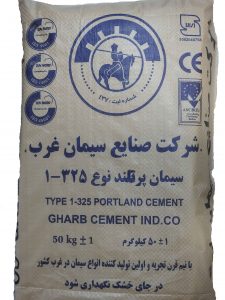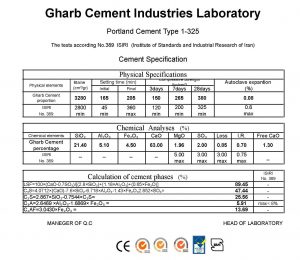 Portland Cement 1-325: This type of cement, also called conventional Portland cement, the most important application of this type of cement along with chemical and physical analysis are: types of cement.
Portland Cement 1-325: This type of cement, also called conventional Portland cement, the most important application of this type of cement along with chemical and physical analysis are: types of cement.
- Basically, the classification and classification of cement varies in different countries and different bases have been chosen for classification, including that cement may be divided as follows:
- Classification based on compressive strength (usually 28-day compressive strength)
- Classification based on different types of cement and from which source such as Portland cement, Robara cement and Pozzolan cement (terrace)
- Categorized based on special specifications such as low hydration heat, chemical resistant cement (e.g. sulfates, alkalis, etc.), cement with high initial resistance
Portland Cement Type 1: It is used as a common Portland cement for general purposes in the construction of concrete or mortar. *This type of cement is characterized by three resistance categories: 1-325, 1-425, 525-1. *West Cement Industries Company has the ability to produce all three types of resistance categories. *Numbers 325-425-525 represent 28-day compressive strength of cement in2 kg/cm. *Compressive strength of cement is measured in the laboratory of factories in the ages of 2, 3, 7 and 28 days, the compressive strength of cement certainly plays a major role in the strength and strength of a building. Portland Cement Type 1-325: *This type of cement is called OPC ordinary protland cement and has general uses in the building and water, while certain characteristics of concrete are not demanded and only the compressive strength of concrete is taken into account. * The characteristics of this type of cement can be pointed to relatively high initial resistance and rapid growth, which has special applications due to the properties of the selected cement, this type of cement is used in all concrete and unarmed structures, bridges, road constructions, sidewalk concrete, concrete pipes and ordinary concrete parts. *Cement 1-325 often supplies type 2 cement specifications (except for resistance to sulfate ions and hydration heat) *It is generally better to use this cement in common cases and not to be used in corrosive environments containing invasive ions. *For high-strength classes, cement 1-425 and 1-525 are used in tropical areas where there is a risk of increasing the temperature of concrete to 32 °C and in bulky concrete to 15°C, the use of this class of cements should be taken with caution. 
